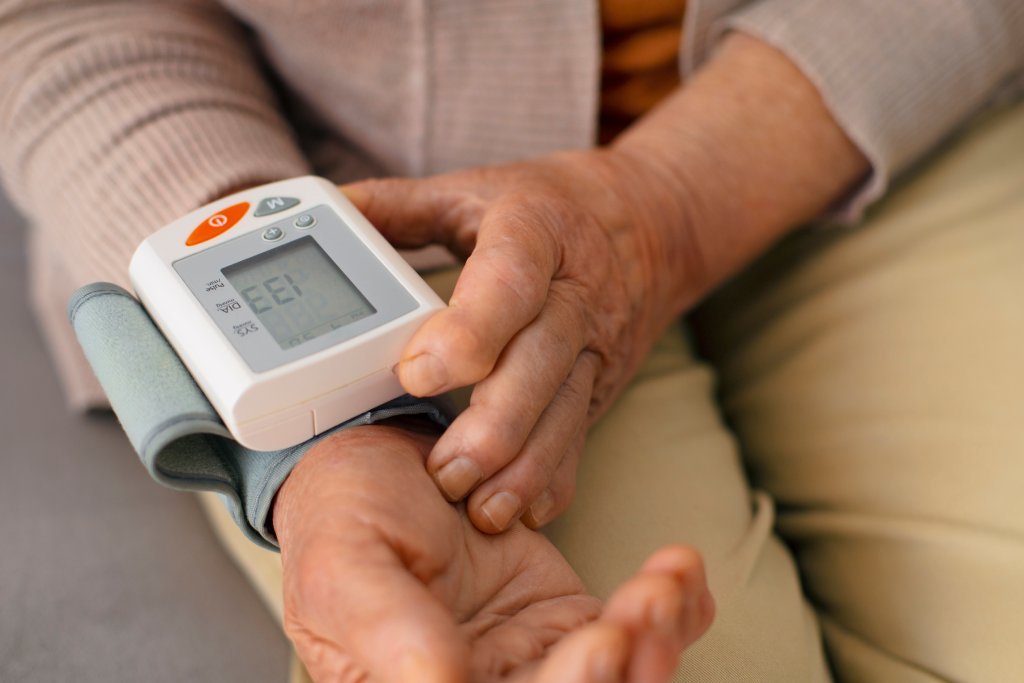BP Monitoring

Each time your heart beats, it pumps blood into your arteries. A blood pressure measurement may be a test that measures the force (pressure) in your arteries as your heart pumps. Blood pressure is measured as two numbers:
- Systolic blood pressure (the primary and higher number) measures pressure inside your arteries when the heart beats.
- Diastolic blood pressure (the second and lower number) measures the pressure inside the artery when the heart rests between beats.
What is Blood Pressure monitoring?
Blood Pressure Monitors measure BP in millimeters of mercury (mm Hg). In general, hypertension may be a blood pressure reading of 130/80 mm Hg or higher.
There are four common categories, Ideal blood weight is categorized as normal.
- Normal blood pressure: Blood pressure is 120/80 mm Hg or lower.
- Elevated blood pressure: The best number ranges from 120 to 129 mm Hg and the foot number is underneath, not over, 80 mm Hg.
- Stage 1 hypertension: The top number ranges from 130 to 139 mm Hg or the foot number is between 80 and 89 mm Hg.
- Stage 2 hypertension: The top number is 140 mm Hg or higher or the foot number is 90 mm Hg or higher.
What is the Procedure of BP Monitoring Test?
What is High BP?
What are the Symptoms of BP?
Most individuals with high blood pressure have no indications, indeed if blood pressure readings reach hazardously tall levels. You can have high blood pressure for years without any indications.
A couple of individuals with high blood pressure may have:
- Migraines
- Shortness of breath
- Nosebleeds
However, these indications aren’t particular. They ordinarily do not happen until high blood pressure has come to a serious or life-threatening stage, but for your clarity keep using the best blood pressure monitor.
What are the Causes of BP?
What are the fundamental types of high blood pressure?
Their are two fundamental types of high blood pressure:
Primary hypertension:
For most adults, there’s no identifiable cause of high blood pressure. This sort of high blood pressure is called essential hypertension or basic hypertension. It tends to develop steadily over many years. Plaque buildup within the arteries, called atherosclerosis, increases the hazard of high blood pressure.
Secondary hypertension:
This type of high blood pressure is caused by an underlying condition. It tends to appear suddenly and cause higher blood pressure than does primary hypertension. Conditions and medicines that can lead to secondary hypertension include:
- Adrenal gland tumors
- Blood vessel problems present at birth, also called inherent heart defects
- Cough and cold solutions, a few pain relievers, birth control pills, and other medicine drugs
- Illicit drugs, such as cocaine and amphetamines
- Kidney infection
- Obstructive sleep apnea
- Thyroid issues
Why is BP test important?
A blood pressure test could be a routine part of most health care checkups or ambulatory blood pressure monitoring suggested by your cardiologist in Nagpur. How regularly you ought to get your blood pressure checked depends on your age and in general health.
- Individuals aged 18 and older with optimal blood pressure and no heart disease hazard factors should have a blood pressure test at least once each 2 to 5 years.
- Individuals age 40 and older — or younger with an increased hazard of high blood pressure — should have a blood pressure test each year. Risk factors for high blood pressure include weight.
- Individuals who have incessant health conditions, such as high or low blood pressure or heart infection, may got to have blood pressure tests more frequently.
Why does BP fluctuate?
Ways to support healthy BP levels
Here are some ways which are suggested by the best Cardiologist for BP medical check up in Nagpur to keep your heart healthy and to keep away from heart diseases:
Eat healthier
Eat lots of natural products, veggies and low-fat dairy and less saturated and total fat. The DASH diet is geared toward lessening blood pressure. Ideally, stay under 1,500 mg of salt a day, but aim for at least a 1,000 mg per day reduction.
Know your numbers
It is suggested that everybody, with diagnosed high blood pressure or not, maintain blood pressure below 120/80 mm Hg. Your health care professional can tell you your individual target blood pressure.
Get active
Target for at least 90 to 150 minutes of aerobic and/or energetic resistance work out per week and/or three sessions of isometric resistance works out per week. Engage in regular physical activity to keep your heart strong.
Limit alcohol and Quit Smoking
Limiting alcohol to less than one drink a day for ladies or two drinks a day for men can help lower blood pressure by around 4 mm Hg. Smoking increases blood pressure. Halting smoking helps lower blood pressure
Decrease the stress
Long-term (chronic) emotional stress may contribute to high blood pressure in a bp medical checkup. More research is required on the impacts of stress reduction techniques to find out whether they can reduce blood weight however until at that point, prioritize your mental well-being.
